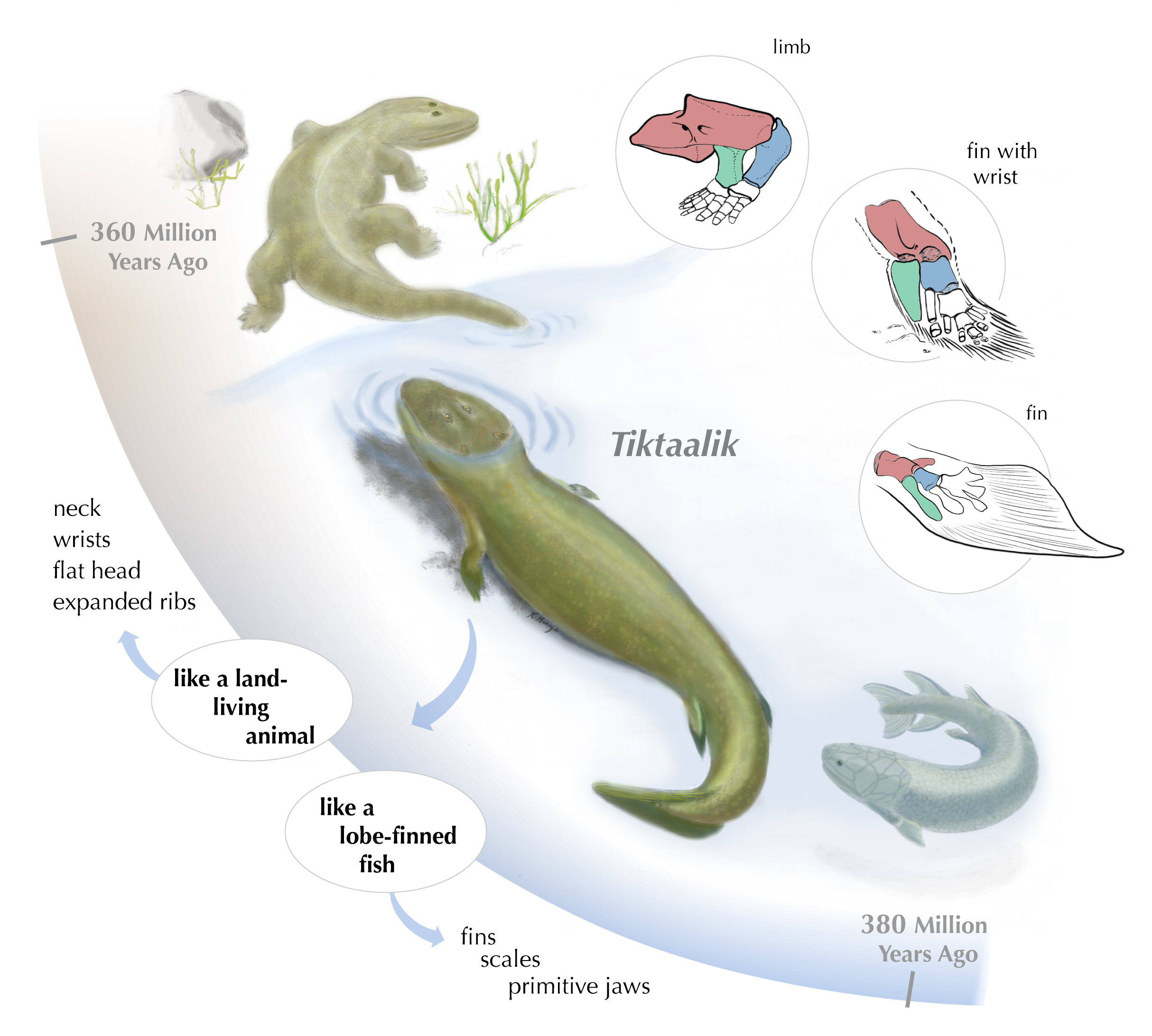There are a few pet peeves I have with various claims about evolution:
1. Some claim evolution is not a predictive science.
How can this possibly be justified! (I've even heard people with biological backgrounds claim this!)
I'll give one example and move on. I was just reading a passage from the book Your Inner Fish. To, paraphrase: before 380 million years ago, there were no known living animals on land. Then, at 360 million years ago, there was extensive evidence that animals were on land.
The author then states he then predicted that there must be a missing link between sea and land animals in rocks of ages between 360 and 380 million years ago. Guess what. He found rocks of this right age and found the missing link. (See picture above).
Can someone explain to me how this, and countless examples like it, doesn't qualify evolution as being considered a predictive science? Seriously!
2. Some claim that microevolution is true but macroevolution is not.
How can someone read the above example and still believe this?
Is there an explanation why, if one assumes #2, that we continue to find missing links between two different species when we look at time periods between when the two different species existed?
Think about it! Take the types of mammals that roamed the earth 10 million years ago and look at ourselves today. Now reject macroevolution. Can anyone give me one intelligent reason why you would expect "missing link" species to be discovered if we go exploring the 5 million years ago era? And yet such missing links are discovered, not just with humans, but between all species living in different time periods.
Can #2 believers explain the existence of missing links (intermediate species)? How can you explain the existence of missing links between species if you reject macroevolution? Seriously!
Facts:
1. Evolution is a predictive science.
2. Macroevolution is the only framework consistant with the data. (Else, explain to me how it is possible to reject macroevolution and still have a theory that predicts the existence of intermediate species we continue to discover time and time again.)
Seriously!

My favorite prediction was by Darwin himself. He knew that biology had some way of passing shared traits to offspring allowing for occasional random mutations to be selected upon. To me, this is as big for biology as Einstein's cosmological constant.
ReplyDeleteStan,
ReplyDeleteYour right, and I believe this is as big of a deal as anything in cosmology. Though I don't want to rank the importance of sciences, many of the fundamental concepts stemming from of Darwin are as big of a deal (if not bigger) as anything in the rest of science.
I'll put it like this:
ReplyDeleteAs much credit as we give Einstein (and he deserves a lot) at the end of the day I think Newton has done the more to lead to the progress of science (and math) than anyone else in history. There is hardly a sector in all the physical sciences, engineering and math that doesn't owe a tremendous debt to Isaac Newton.
And I would say that Chalres Darwin is the Isaac Newton of the biological sciences. There is hardly a sector in all the biological sciences that doesn't owe a tremendous debt to Charles Darwin.
Darwin was one smart dude. He got so many things right from the beginning.
ReplyDeletebtw, I read that book last year. Good stuff.
Darwin also made another pretty bold prediction regarding the age of the earth. He noted that given his solution to the species problem, he needed hundreds of millions of years, and so the earth had to be very, very old. The age of the earth was a difficult and disputed question, with notables like Lord Kelvin claiming that the earth couldn't be as old as required by Darwin's theory. Darwin proved right, which is, I think, a predictive success of selection theory.
ReplyDeleteMostly Anonymous,
ReplyDeleteExcellent point!
This just goes to underscore why good science needs to make predictions.
ReplyDeleteIf we didn't require this, we would get confused and buy into microevolution-happens-and-macroevolution-doesn't theories. However, upon examination these theories do not make any substantiated predictions.
Instead, one finds the "intermediate species" and other examples the commenters have mentions predicted by macroevolution.
Only macroevolution has made predictions that have been verified by experiment. Pro-micro-anti-macro theories have not and are therefore DOA.
*You really have to reject the idea that a "good" theory makes well defined predictions that can be substantiated by experiments to be against macroevolution while being for microevolution as such theories make none that have.*
Joe-
ReplyDeleteLoved it! I'm with you. I don't see how so many can continue to decry evolution, especially macroevolution in the face of so much evidence. But alas, it took Galileo, Copernicus, Newton, et al. hundreds of years to convince people of the heliocentric sun-earth model. Craziness! ::Sigh:: but some still think the world is flat (exhibit http://theflatearthsociety.org/cms/)
jmb275,
ReplyDeleteThanks. And you're right. It is mind-boggling to think that people still think the earth is flat. But alas, people denying macroevolution will meet the same historical fate of such people.
Always remember: Facts are stubborn things.
"Some claim evolution is not a predictive science."
ReplyDeleteThis seems to be a misunderstanding of something that is in fact true. The central claim of evolution -- survival of the fittest -- is non-falsifiable. Even Karl Popper pointed this out. The reason is that it's circular. By definition those that survive are the fittest. Thus you can't ever falsify the claim.
This is NOT the same as the theory allowing for or not allowing predictions. But I can see how people could confuse the two points.
Bruce,
ReplyDeleteInteresting point.